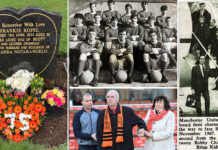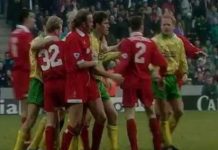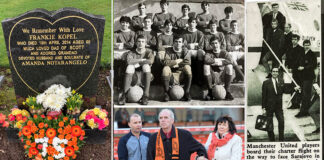As an Englishman I am thrilled that Roy Hodgson did what he promised and secured qualification for the 2014 FIFA World Cup. What makes me proud is that Roy’s Boys booked their place in Brazil with a swagger, proving all the doubters and the critics wrong in sparkling fashion. There is even satisfaction at the way an honourable man has made a monkey out of the media who mocked his appointment less than 18 months ago.
Instead of getting behind the new man, the pathetic Sun ridiculed the way Hodgson speaks. It was a cynical attempt to make money out of a headline designed to sell newspapers. It backfired because even their own readers recoiled in embarrassment at the headline-writers’ sick sense of humour. While the Sun overstepped the mark of decency, the rest of the media have never been shy in taking aim at the man in the top job. Many felt vindicated because of a blind loyalty to Harry Redknapp, the man the majority of hacks wanted to be at the helm because he has a flair for giving the media what they want. I must admit I was initially disappointed that Redknapp was overlooked. but I have always given Hodgson the respect he deserves.
As I wrote a week before the start of Euro 2012: “There is little doubt in my mind that the new England boss is going to restore pride in the top job. And that is just as important (as success) this time around.” Post tournament I concluded: “Not only has Roy Hodgson shattered the myth that managing England in the modern era is an impossible job, he has turned around a team with no direction and no hope into a confident squad with no fear and a fresh belief that nothing is impossible. To claim a quarter-finals showdown with Italy at Euro 2012, Roy’s boys have confounded the critics. Only all-conquering Germany won more points in the Group stages. And in skipper Steven Gerrard England have been inspired by one of the stand-out players of the tournament.”
What makes Hodgson’s success so rewarding is that he has done it his way, learning and moving on from his mistakes and never losing sight of the end goal and his footballing philosophy, whatever the media throw at him.
And it is not just the tabloids who are quick to criticise at every opportunity. Just about every national newspaper has turned on Hodgson and his predecessors whenever they get the chance. While former England player Gary Lineker, a man who is always ready with a putdown but never goes out of his way to contribute anything positive, is just one example of the broadcast media who have become part of the pack that feeds on the game and never shirks from sticking the boot in.
What has made the England job increasingly difficult ever since Sir Alf Ramsey’s heroes won the World Cup at Wembley in 1966 is a media that revels in destruction, confrontation and fostering an ugly blame culture that stifles creativity and self-expression. It is no surprise that playing for England was losing its appeal for an increasing number of players. While big name managers primarily viewed the challenge as a chance to bank a gold-plated pension.
It is not just the job of managing England that has suffered at the beck and call of the media. Just take a look at the Premier League. Only Arsene Wenger, another dignified man with the thickest of skins, has had any significant time in the hotseat. While I am not an Arsenal fan and never will be, I do feel a warm glow of satisfaction in publicly sticking by Wenger when the knives were out, now that he has his team sitting proudly at the top of the Premier League summit having pulled off the transfer coup of the summer in signing Mezut Ozil.
What really makes me laugh is the way the media are skilled in turning things round to suggest they were right all the time to shower abuse on the men whose jobs they could never come close to doing if they were given the chance. Martin Samuel, great writer that he is, does just this in the Mailonline when he argues that the critics got it right because they wanted Hodgson to be less cautious and Wenger to spend big. This argument is so simplistic that I almost did myself injury laughing at Samuel’s bare-faced arrogance.
Tell me honestly, how many people sitting in Roy Hodgson’s shoes would have gambled on picking Andros Townsend for England’s two decisive World Cup qualifiers against Montenegro and Poland. And how many football managers would have succeeded in persuading Ozil to join their team. Not that team selection and transfer activity is the be all and end all. Tactics and creating an unbreakable team spirit is something that only the most gifted of managers get right.
What stands out like a beacon from this World Cup qualifying campaign for England is that Hodgson has created the type of team spirit that we are more used to seeing at a successful club side. In much the same way that Jack Charlton brought success to the Republic of Ireland with a limited pool of talent during his colourful reign from 1986 to 1996, the oldest ever manager to be handed the so-called “Impossible Job” has already done something that his over-rated predecessor Fabio Capello miserably failed to achieve. He has restored English pride for the fans, the players and the manager himself.
The media critics who did not want Hodgson to get the job in the first place will now become self-appointed cheerleaders until the next bad result or shift in public opinion. But we can only make real progress with a long term strategy. Not the kind of short-term knee jerk decision making that we see at some of our biggest club sides. That is why Hodgson must be given a fair opportunity to build on what he has achieved so far. We owe him that at least for getting England to what will be the biggest World Cup in our lifetime.
















